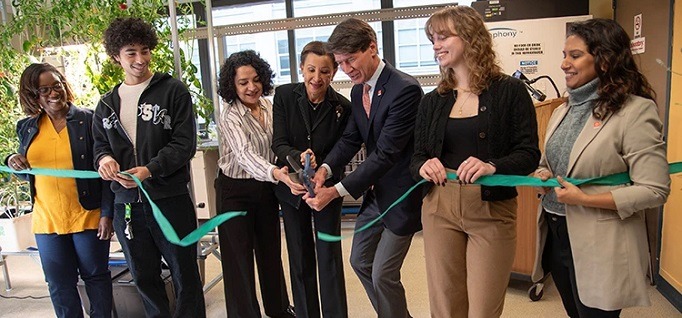New lab will prepare tomorrow’s climate champions
By Elizabeth Streich
January 30, 2024
LaGuardia Community College/CUNY, has opened a new hydroponic research lab on campus where tomorrow’s climate champions will be trained. The college collaborated with Congresswoman Nydia Velázquez (NY-7th District) and NY Sun Works on the new lab.
The lab is one of the first at a community college in NYC. Velázquez, NY Sun Works Director Manuela Zamora, and LaGuardia leadership, professors and students attended a ribbon cutting Jan. 23, marking the lab’s opening.
The hydroponic research lab at LaGuardia is both a classroom and research space. It is outfitted with equipment provided by NY Sun Works, a non-profit that builds innovative science labs in urban schools.
On February 17, 2023, NY Sun Works announced that it had received $800,000 in Community Project Funding from Congresswoman Velázquez to expand climate and sustainability education throughout Queens and Brooklyn. LaGuardia is one of 20 schools, and the only college, to be selected for a hydroponic lab. The remaining schools serve K–12 students.
“LaGuardia Community College is committed to educating students to help them find sustainable solutions to problems in today’s world,” said Kenneth Adams, president of LaGuardia Community College. “Hydroponic farms offer a pathway towards a more sustainable food ethic that prioritizes the health of our food, bodies, and environment without the heavy use of chemicals.”
“LaGuardia’s new hydroponic research lab will help train educators to pass along their knowledge in hydroponic systems and launch these projects in more classrooms so more students can learn about local food production, healthy eating, climate, and sustainability. I’m so glad to see LaGuardia making this a part of their offering, and I thank all the leadership and staff at the college and New York Sun Works for making this happen,” said Congresswoman Velázquez.
“We are excited to welcome LaGuardia Community College to our cohort of Queens schools and provide hands-on climate and sustainability education through state-of-the-art hydroponics technology for the city’s young learners,” said NY Sun Works Executive Director Manuela Zamora. “Our urban farms strive to encourage students to explore opportunities and experiences in STEM. We are committed to empowering a new generation of scientists, climate advocates and community leaders to create solutions to local and global resource challenges.”
“Hydroponics, a type of Controlled Environment Agriculture (CEA), is the future of farming,” said Dr. Preethi Radhakrishnan, professor of biological sciences and director of LaGuardia’s environmental science program. “It involves automated, vertical farming, where plants are grown in a water-based nutrient solution rather than soil. Hydroponics offers many advantages over traditional farming in an urban setting—it requires significantly less land, uses 70–95% less water, enables higher crop density—resulting in better quality, nutrient-dense produce. There’s a lot of technical skill required to grow in CEA.”
The new hydroponic research lab “will provide valuable learning and employment opportunities for environmental science students, especially those in our Sustainable Urban Agriculture track,” added Radhakrishnan. “We’re doing something unique and innovative by teaching them three different kinds of farming in three different urban ecosystems. We’re in the process of building an urban farm on campus—where students will learn traditional, regenerative, land-based farming. Through our collaboration with Sky Farm (formerly known as Brooklyn Grange) in Long Island City, students learn about rooftop farming and green infrastructure. And now with this new hydroponic research lab, thanks to NY Sun Works and Congresswoman Velázquez, we’ll teach them about CEA, grounded in advancing equity in food systems as a whole including food law and policy, through the lens of climate resilience.”
NY Sun Works delivers inquiry-based science and sustainability education through the lens of urban farming. The goals are to support each school’s long-term capacity to deliver a high-quality science program; optimize students’ learning experience in the hydroponic classroom; and expand access to fresh produce for students and their families, while covering the Common Core, Scope and Sequence and EfS science standards. Hydroponic technology is indoor vertical farming that enables the cultivation of plants in an indoor environment. Rather than from the sun, plants receive energy from LED lighting that is tailored specifically to the energy needs of the plants. Instead of using soil, seeds are planted in soil-free growth mediums.
Partner schools like LaGuardia Community College will receive ongoing professional development training for science educators and weekly visits from a hydroponic specialist to guide teachers in hydroponic systems maintenance, provide planting, harvest, and produce distribution support; and clean, prep, and troubleshoot systems.
And the hydroponic research lab will benefit the entire community.
“The produce we grow may be shared with the cafeteria to add new healthy options or given to students and community members in need through the LaGuardia CARES pantry or served to children in LaGuardia’s on-campus day-care,” Radhakrishnan said.
This article was originally posted here.



